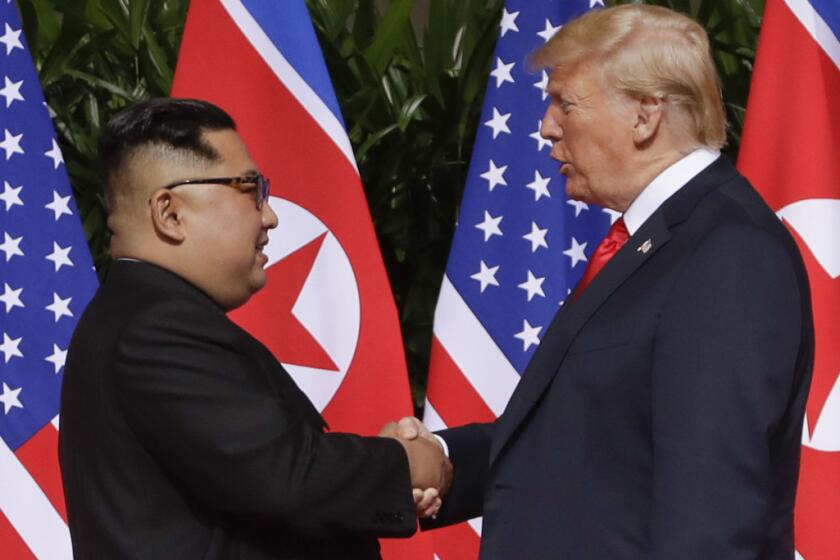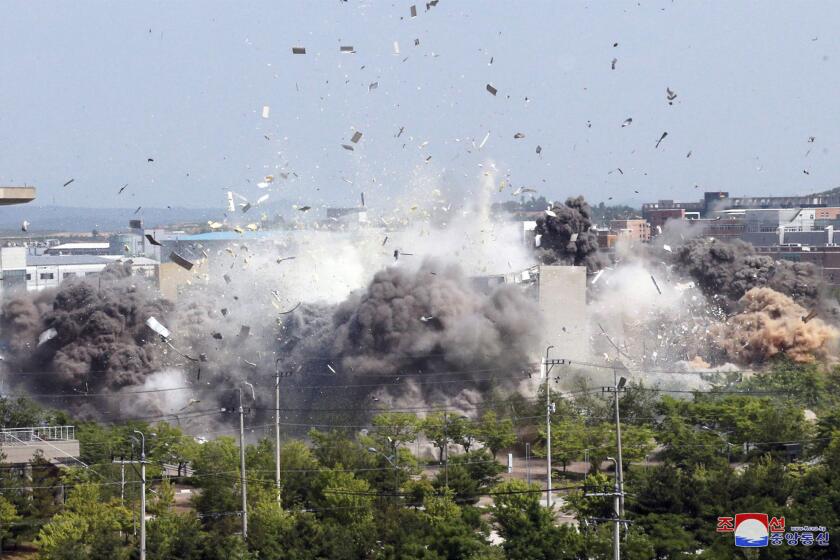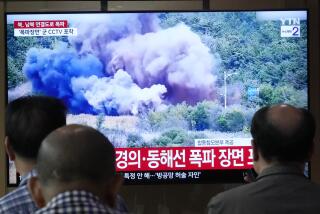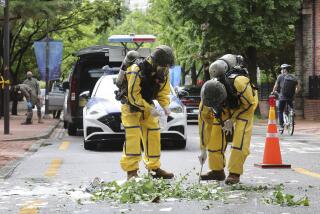Seoul accuses North Korea of killing South Korean official, burning his body
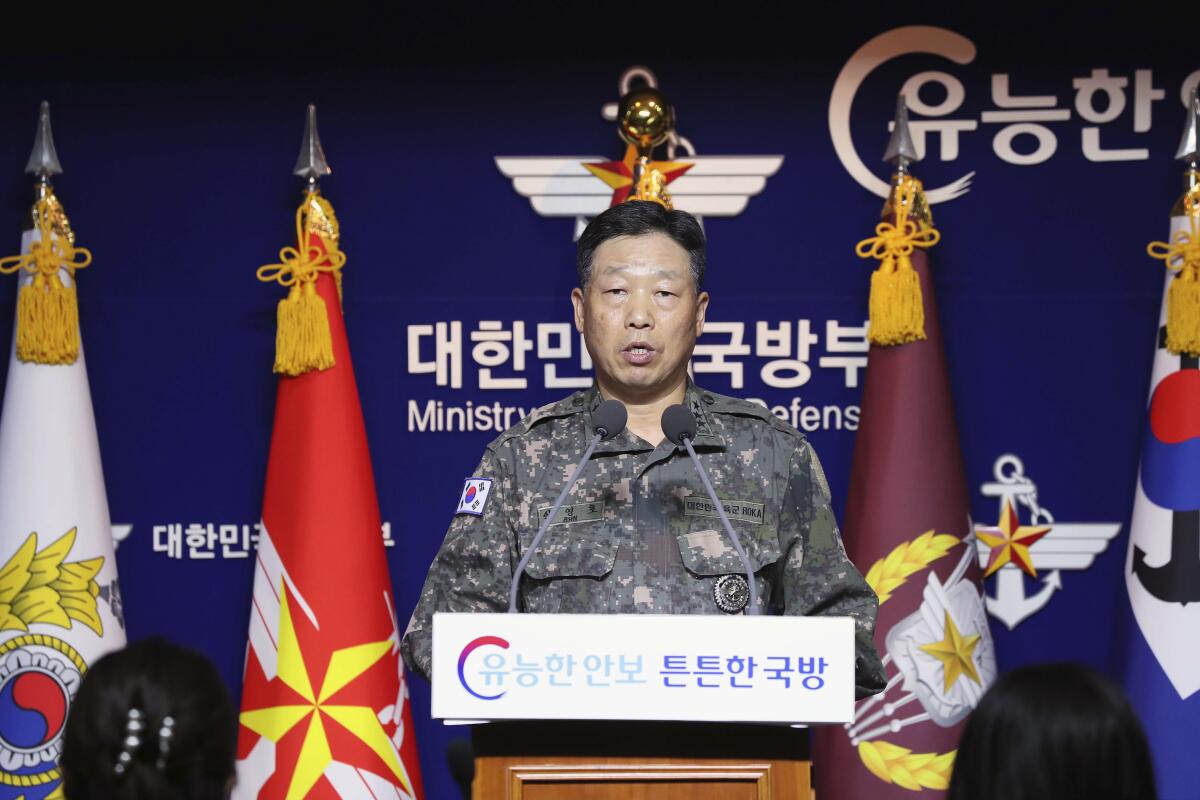
SEOUL — South Korea on Thursday accused North Korean troops of fatally shooting a South Korean government official and setting his body on fire.
The 49-year-old was found floating in North Korean waters and may have been attempting to defect, South Korean officials said.
Seoul condemned what it called North Korea’s “atrocious acts” and urged it to apologize and punish those responsible. It’s unlikely that Pyongyang will accede to the demand, which would deal the two Koreas’ strained ties a further setback, observers say.
According to South Korean officials, the man disappeared from a government ship that was checking on potential unauthorized fishing in an area south of the two Koreas’ disputed sea boundary Monday, a day before he was found alive on a floating object in North Korean waters.
North Korea dispatched a boat with officials in gas masks Tuesday afternoon to find out why he was there. Later in the day, a North Korean navy boat came and opened fire on him, South Korea’s Defense Ministry said.
Sailors from the North Korean boat then poured gasoline on the man’s body and set it alight, the Defense Ministry said, citing intelligence gathered by surveillance equipment and other assets.
Trump threatened ‘fire and fury,’ then met three times with North Korea’s ruler in an ambitious bid to seek nuclear disarmament. It failed.
It’s unclear how the man ended up in North Korean waters. But a South Korean defense official, citing unspecified intelligence, said he might have been trying to defect to North Korea. The official, who spoke on condition of anonymity according to ministry rules, said the man was wearing a life jacket on a small floating object when he was found.
The official said North Korea might have decided to kill the man in line with its stringent anti-coronavirus policies, which include shooting anyone illegally crossing the border.
Gen. Robert Abrams, the commander of U.S. troops in South Korea, said last month that North Korea had put special forces along its border with China to keep smugglers out and that the forces had “shoot-to-kill orders in place” aimed at preventing the coronavirus from entering the country.
North Korea has steadfastly maintained that it has not had a single coronavirus case, a claim widely disputed by many foreign experts. Observers say an outbreak could cause devastating consequences in North Korea because of its broken public healthcare system and chronic shortage of medical supplies.
North Korea says it will reinstall guard posts and resume military exercises at front-line areas as its rhetoric turns more bellicose.
South Korea sent a message to North Korea via a communication channel at the U.S.-led U.N. Command in South Korea on Wednesday to ask about the missing official. But Pyongyang has not responded, according to the South Korean Defense Ministry.
Following a South Korean National Security Council meeting Thursday, senior presidential aide Suh Choo-suk said that North Korea must apologize for its “act against humanity,” reveal the full details of the case and take steps to prevent similar incidents. A South Korean Unification Ministry spokesman issued a similar statement.
“For whatever reason, North Korea cannot justify its soldiers fatally shooting our citizen and damaging his body, though he was unarmed and had no intention of resistance,” Suh said. He said South Korea would boost its defense posture along the border.
Little information has been released about the dead man except that he was among 18 officials aboard a boat belonging to South Korea’s Oceans and Fisheries Ministry. When his colleagues searched for him after his disappearance, they found only his shoes. A search involving aircraft and seagoing vessels came up empty-handed, according to the defense and oceans ministries.
News Alerts
Get breaking news, investigations, analysis and more signature journalism from the Los Angeles Times in your inbox.
You may occasionally receive promotional content from the Los Angeles Times.
The poorly marked western sea boundary between the two Koreas has been the site of several bloody naval skirmishes and two deadly attacks blamed on North Korea in recent years. The South Korean fisheries ministry ship was conducting an operation near South Korea’s Yeonpyeong Island, which was hit by North Korean artillery in 2010, killing four people.
The incident is expected to worsen already-frosty Korean ties. Exchange and cooperation programs have virtually all been suspended. In June, North Korea blew up an inter-Korean liaison office to protest South Korean civilians sending leaflets against the North across the border.
Some experts questioned Seoul’s suggestion that the dead official might have been attempting to defect. Defections of South Koreans to the north are highly unusual. More than 30,000 North Koreans have fled to South Korea in the past 20 years for political and economic reasons.
“A public servant defecting to North Korea? I think it sounds a bit strange,” said Choi Kang, vice president of Seoul’s Asan Institute for Policy Studies. “Why did North Korea shoot a man defecting to the North voluntarily? I can also say the burning of his body was an attempt to conceal evidence.”
South Korea’s liberal government, led by President Moon Jae-in, has faced criticism by conservatives that it’s sympathizing with North Korea too much and fails to respond strongly enough to the North’s provocations.
The main conservative opposition party urged Moon’s government to take stern action. “The reason for the government’s existence is protecting its people and their property,” a party statement said.
More to Read
Sign up for Essential California
The most important California stories and recommendations in your inbox every morning.
You may occasionally receive promotional content from the Los Angeles Times.
